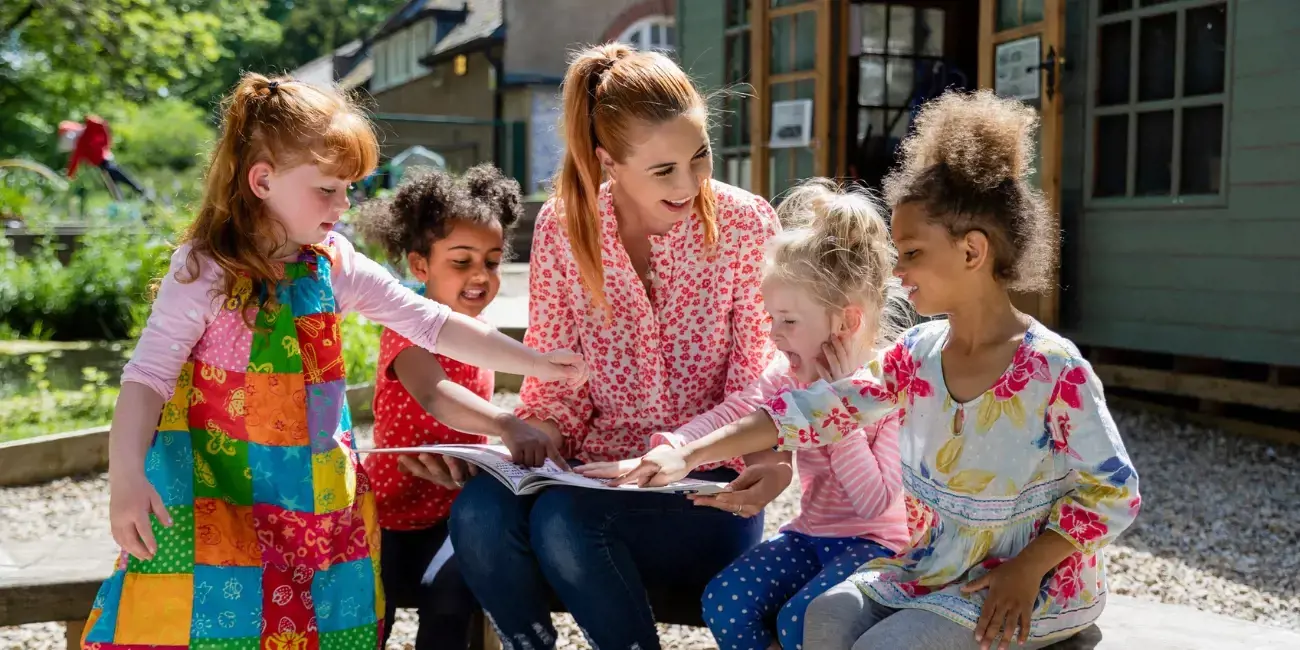Previously, we discussed what the CEFR is, the importance for EFL/ESL learners and what is expected from every learner at a specific stage but we also introduced the importance of understanding the role of age when analyzing how we should be learning and how teachers should be teaching.
Pre-Kindergarten (Pre-K): Ages 3–5
- Recommended Approach for Reading: Storybooks with large, colorful illustrations, interactive read-alouds, and activities that involve moving, singing, and tactile experiences (e.g., turning pages, handling props).
- Research Insight: Catherine Snow’s (1977) work marks that language acquisition in early years is enhanced through social interactions and responsive environments. This means that engaging children in stories they can touch, see, and talk about—using everyday contexts—develops foundational vocabulary and comprehension.
Early Childhood (Children): Ages 6–12
- Recommended Approach for Reading: Picture books and short stories that reflect familiar themes (like family, school, or animals), paired with comprehension activities, vocabulary exercises, and projects based on story themes.
- Research Insight: Piaget’s concrete operational stage (1972) suggests that children at this age understand best through concrete examples. Jim Cummins (2000) highlights that reading at this stage should also support Basic Interpersonal Communication Skills (BICS) and Cognitive Academic Language Proficiency (CALP), helping children make connections with social and academic language.
Adolescence: Ages 13–18
Adolescents benefit from peer collaboration, abstract themes, and reflective reading activities. Since they can handle more complex concepts, reading materials should include narratives and non-fiction that explore themes relevant to social identity, relationships, and personal experiences. Group discussions and collaborative projects related to the readings can deepen engagement.
- Recommended Approach: Short novels, articles, and stories that encourage critical thinking and discussions about values, identity, and real-life challenges. Reading groups or book clubs work well, along with reflective journaling on reading topics.
- Research Insight: Vygotsky’s sociocultural theory (1978) emphasizes the value of social learning for adolescents, where interaction with peers enhances language skills. Adolescents are more likely to engage deeply with reading materials that allow for social discussion and critical reflection, making group discussions and reflective activities essential.
Young Adults: Ages 19–25
- Recommended Approach: Engaging with texts that require deeper analysis, such as opinion pieces, academic articles, and literature. Activities can include self-reflective exercises, peer feedback on interpretations, and projects that encourage application of reading to real-life situations.
- Research Insight: According to Oxford (1990), metacognitive strategies like planning, monitoring, and evaluating are valuable for young adults. These strategies allow learners to reflect on their reading, make personal connections, and take ownership of their learning, which aligns with their goals for academic or career advancement.
Adults: Ages 26 and Up
Adults often have established cognitive skills and benefit from reflective and real-world application-based reading activities. Since they may be learning with specific goals (e.g., career advancement, personal growth), reading should be practical and relevant to their lives. Adults can manage advanced, specialized texts and benefit from activities that prompt critical analysis and real-life application.
- Recommended Approach: Practical materials, such as professional articles, instructional guides, or news reports. Activities should focus on critical reading, analyzing arguments, and applying insights to real-life situations (e.g., discussing articles in professional contexts).
- Research Insight: Knowles’ andragogy principles (1984) indicate that adults benefit from learning that aligns with their practical needs and goals. Activities that promote self-directed learning and allow adults to engage with texts relevant to their lives maximize engagement and retention.
References
- Cummins, J. (2000). Language, Power, and Pedagogy: Bilingual Children in the Crossfire. Multilingual Matters.
- Knowles, M. S. (1984). The Adult Learner: A Neglected Species. Gulf Publishing.
- Oxford, R. L. (1990). Language Learning Strategies: What Every Teacher Should Know. Heinle & Heinle.
- Piaget, J. (1972). The Psychology of the Child. Basic Books.
- Snow, C. E. (1977). The Development of Conversation between Mothers and Babies. Journal of Child Language.
- Vygotsky, L. S. (1978). Mind in Society: The Development of Higher Psychological Processes. Harvard University Press.







No comments:
Post a Comment